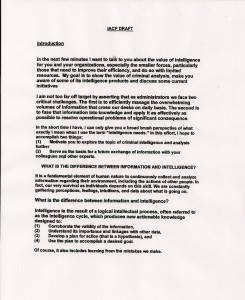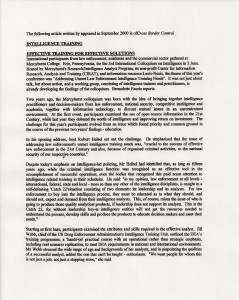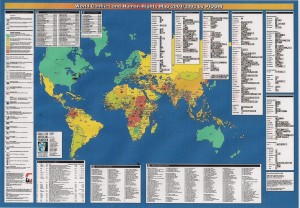
Click on the Frog to visit Berto Jongman's page from last year, along with his Golden Candle Award.

Below is his contribution to OSS '02.
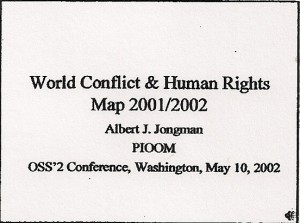

Visit Dick Klavans, the top gun for mapping science & technology across all boundaries. Below, with Brad Ashton, his co-author for Keeping Abreast of Science and Technology: Technical Intelligence for Business, is the lecture he presented at OSS '02 on this topic:
PDF: OSS2002-02-06 Klavan Hotspots
2019 Website: https://www.scitech-strategies.com
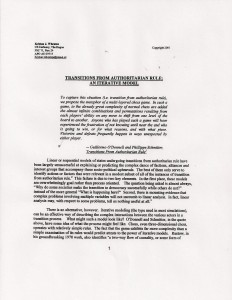 Kristan Wheaton, the Army field grade officer who predicted the Balkan meltdown years in advance but could not get command attention (he subsequently wrote a book,The Warning Solution : Intelligent Analysis in the Age of Information Overload that needs to be updated and reprinted. The bottom line: policymakers are dealing with $50 billion problems “right now” and the intellgence profession has not matured to the point that it can compell attention to $1 billion “peaceful preventive measures” as General Al Gray, USMC, called them in his article, “Global Intelligence Challenges in the 1990's,” American Intelligence Journal (winter 1989-1990).
Kristan Wheaton, the Army field grade officer who predicted the Balkan meltdown years in advance but could not get command attention (he subsequently wrote a book,The Warning Solution : Intelligent Analysis in the Age of Information Overload that needs to be updated and reprinted. The bottom line: policymakers are dealing with $50 billion problems “right now” and the intellgence profession has not matured to the point that it can compell attention to $1 billion “peaceful preventive measures” as General Al Gray, USMC, called them in his article, “Global Intelligence Challenges in the 1990's,” American Intelligence Journal (winter 1989-1990).
The OTHER big problem that the U.S. Government has, apart from the corruption of Congress and the two-party political systems that services special intersts at the expense of the public interest, is the casual acceptance by the U.S. Government of authoritarian regimes. Indeed, of 44 dictatorships on the planet, all but two (North Korea and Cuba) are “best pals” with the U.S. Government because they all support rendition and torture and being “tough on terrorism” in return for liberal unaccountable funds from the U.S. taxpayer.
Achieving a prosperous world at peace demands and end to the concentration of wealth by illicit means. That in turn demands an end to dictatorial governments and a restoration of the rights of indigenous peoples. It is in that context that this paper matters.
The Global Futures Partnership (GFP) is a strategic “think and do tank” that undertakes unclassified global outreach for CIA and other Intelligence Community elements on the most important issues facing the intelligence community today and in coming years. It conceptualizes and implements interdisciplinary and multi-organizational projects on key intelligence issues with leading thinkers from academia, business, strategy, and intelligence consultants.
Below is the citation for the award given to the visionary, founder, and core catalyst within the GFP, followed by two CIA seals: the one on the left leads to the pro forma page on GFP, sadly not offering access to its unclassified and often brilliant productions over the past several years, and the one on the left offers a link to a presentation on “Meeting 21st Century Transnational Challenges: Building a Global Intelligence Paradigm” by Roger George, possibly the most tangible evidence of GFP's influence on CIA's leadership.
OSS '02: 21st Century Emerging Leadership Award. Global Futures Partnership, Central Intelligence Agency. Under the leadership of Carol Dumaine with her extraordinary vision, the Global Futures Partnership has created strategic learning forums bringing the rich perspectives of the outside world into the classified environment in a manner never before attempted. This official but revolutionary endeavor nurtures an outside-in channel for integrating a diversity of perspectives. It is a vanguard toward a future in which the lines between national and global intelligence, and between governmental and nongovernmental intelligence, are blurred into extinction.
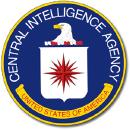
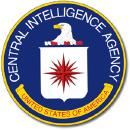
The GFP is not to be confused with the Open Source Center (OSC). The first is a visionary outreach elements that seeks to share information and achieve multi-national sense-making, in one instance working with up to 35 countries. The OSC is a bureaucratic unit that classifies everything it creates and refuses to engage with any countries other than the standard English-speaking allies and a couple of others totalling eleven including the USA, Canada, the UK, Australia, you get the idea….
The CIA leadership never properly supported the GFP. Its vision
|
2002 |
SE |
Training | Bjore | OSINT 101: Sense-Making |
|
2002 |
US |
Training | Black | OSINT 101: Desktop Tools for Smart People |
|
2002 |
US |
Training | Chester | OSINT 101: NATO Lessons Learned |
|
2002 |
US |
Training | Henk | OSINT 101 Respecting the Cultural Dimension: Intelligence and Africa |
|
2002 |
US |
Training | Hock | OSINT 101: Overview of the World of Information |
|
2002 |
US |
Training | Hohhof | OSINT 101: Competitive Intelligence Analysis Tools & Web-Sites |
|
2002 |
US |
Training | Klavans & Ashton | OSINT 101: Technology Mapping with Open Sources of Information |
|
2002 |
US |
Training | Lee | OSINT 101: Geospatial Information Sources |
|
2002 |
US |
Training | Manwaring | OSINT 101: Intelligence & Asymmetric Warfare |
|
2002 |
US |
Training | Marshall | PSINT 101: OSINT and Global Hotspots |
|
2002 |
US |
Training | Moore & Krizan | OSINT 101: Core Analytic Competencies |
|
2002 |
US |
Training | Smith | OSINT 101: Internet and Commercial Online Exploitation |
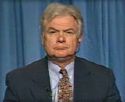
PLATINUM Professor Robert Heibel
Professor Robert Heibel, a veteran of the Federal Bureau of Investigation, is unique for having established both an undergraduate and a graduate program in intelligence and research analysis. His pioneering efforts have provided varied intelligence communities with very high-quality individuals, properly trained, at a time when their respective countries need them badly. His development of training materials that did not exist, of a training program that did not exist, of a philosophy of education in the national service that did not exist anywhere else at the time, is worthy of the highest regard.
Below are his oral and written contributions to OSS '01.
